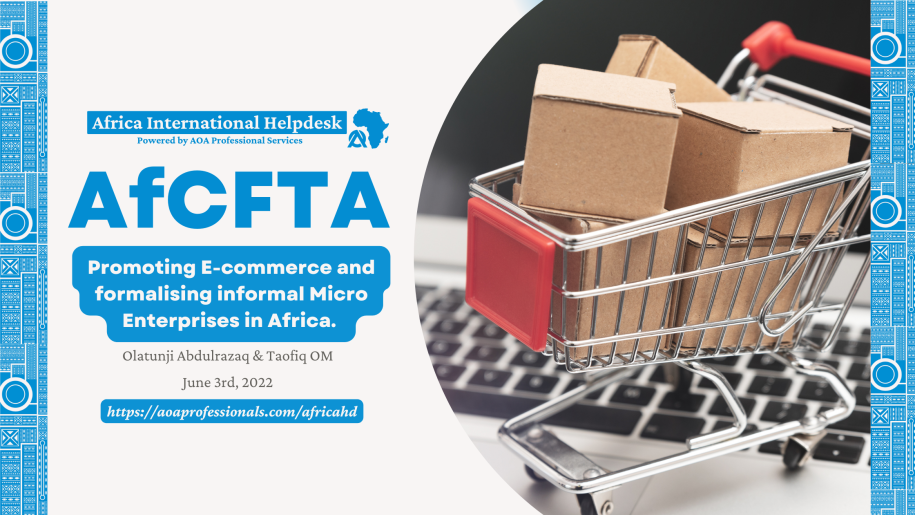The Organization for Economic Co-operation and Development (OECD) defines E-commerce as “The sale or purchase of goods or services, conducted over computer networks by methods specifically designed for the purpose of receiving or placing of orders”.
The most popular definition of E-commerce is that of the World Trade Organization (WTO) which says that E-commerce is “the production, distribution, marketing, sale or delivery of goods and services by electronic means”.
The African Continental Free Trade Area (AfCFTA) has opened a $3.4 trillion borderless market created by the AfCFTA to present an opportunity and rekindled hopes for African recovery through trade in a post-Covid-19 world.
E-commerce and the Boost for Micro-Enterprises
Micro enterprises are defined as having less than 10 employees with $100,000 or below in assets and annual turnover. There are 44 million registered micro enterprises on the continent and an estimated equal number or more operate in the informal economy. The upcoming AfCFTA protocol on E-commerce can leverage instant and inclusive digital payments to address the unique challenges of Africa’s micro-enterprises.
There are widespread E-commerce use cases in Africa in which transactions are initiated online but delivery, fulfilment, or payment is achieved offline. In some other use cases, the order is placed offline, but the delivery, fulfilment or payment is achieved online.
It is recommended that the upcoming E-commerce protocol takes a broader view of the definition of the term (E-commerce) as defined by the World Trade Organisation (WTO) and includes instant and inclusive payment channels such as mobile money to ensure the inclusion of Africa’s formal and informal micro-enterprises.
According to a report by the World Bank, AfCFTA has the potential to boost regional income by 7% or $450 billion, speed up wage growth for women, and lift 30 million people out of extreme poverty by 2035. Wages for both skilled and unskilled workers will also increase by about 10 per cent.
Formalizing Africa’s Informal Micro Enterprises
The AfCFTA should formalise informal micro-enterprises through the protocol on E-commerce and should particularly encourage African countries to enact specific legislation simplifying registration and regulatory requirements for new firms, and simple tax systems including electronic payment of taxes.
The International Monetary Fund (IMF) notes that policies that are effective in formalizing the informal sector include among other things, increased access to formal financial and economic resources and leveraging mobile money and digital payments.
Conclusion
Workers in the informal economy experience specific disadvantages and the most severe decent work deficits. As individuals and a group, their well-being is precarious and vulnerable.
AfCFTA is providing Africa with renewed hope for a future of economic prosperity. This hope is equally shared by Africans and even others outside the continent. Implementation of the AfCFTA agreement is reportedly going well and progress is being made with the negotiations.
The AfCFTA protocol on E-commerce should set the agenda for seamless cross border payment to drive cross border trade and rally countries around the goal of creating the regulatory environment for informal micro-enterprises in Africa.
DISCLAIMER:
The material contained in this publication is provided for general information purposes only and does not contain a comprehensive analysis of each item described. Before taking (or not taking) any action, readers should seek professional advice specific to their situation. No liability is accepted for acts or omissions taken in reliance upon the contents of this alert.
AOA Professional Services is an indigenous tax, regulatory and advisory service firm driven by the values of professionalism and partnership. For further information on the subject matter, reach out to our Africa International Helpdesk

